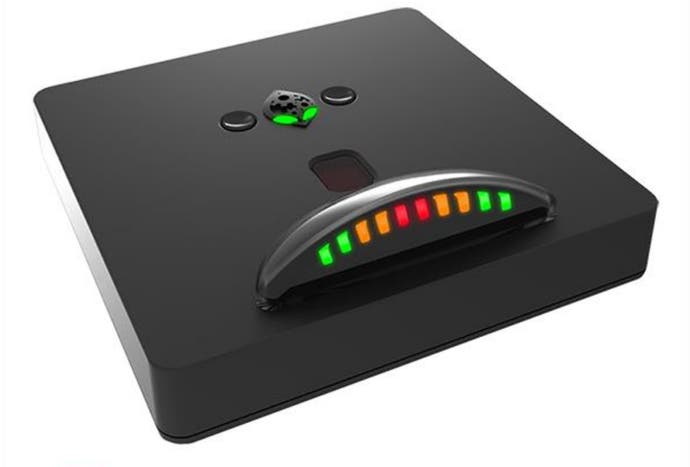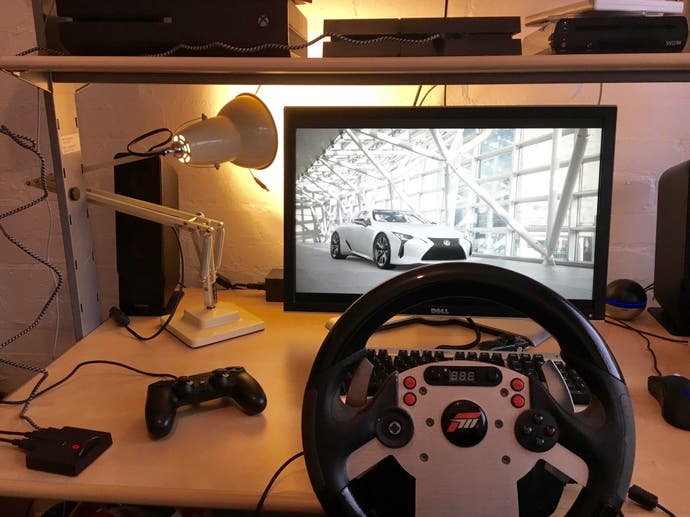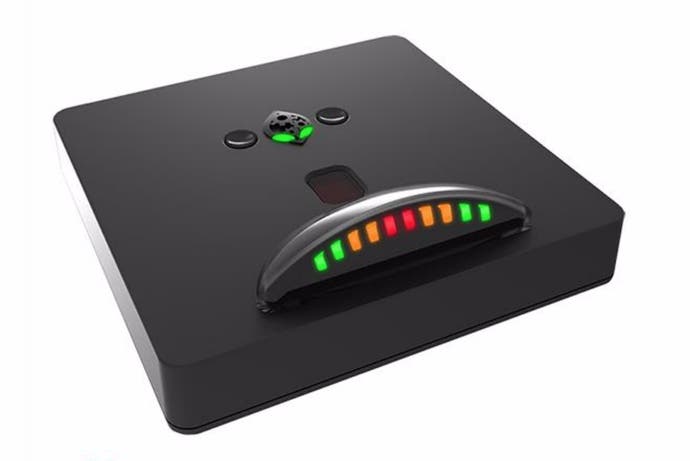This gadget fixes the video game steering wheel compatibility nightmare
Introducing DriveHub.
One of the more irritating facets of game consoles' generational cycle is the scorched-earth approach to peripheral compatibility. Since the business began, platform holders and their partners in the peripheral business have used new console generations as an excuse to get gamers to shell out again for new controllers and other accessories they've already bought by ensuring older models won't work with the new console hardware. It is, and has always been, a bit of a racket.
This is particularly aggravating - and expensive - when it comes steering wheels for racing games. These are complicated and very expensive pieces of kit; a well-built force-feedback wheel with pedals and a shifter will set you back several hundred pounds. If you really enjoy racing games, it's a good investment, but if you have to replace the whole thing - or at least the steering wheel base, the most expensive component - every four or five years, it becomes prohibitively expensive. What makes it doubly annoying is that most 'obsolete' console wheels will continue to work with contemporary PC games long into the next generation.
(Wes investigated this issue back at the start of the console generation, and found that the new consoles' requirement for security chips in all peripherals was behind it - but that wasn't quite the whole story.)
Beyond generational obsolescence, there's another annoyance for console racing game fans: Sony and Microsoft currently block compatibility with each other's consoles, so if you own both PS4 and Xbox One and want a single wheel that you can use with Gran Turismo and Forza Motorsport, you're out of luck.

Enter DriveHub, a new gadget from Canadian peripheral company Collective Minds. This tiny little plastic box retails for 89.99 (it's the same price in pounds, dollars and euros) and claims to bridge these annoying compatibility gaps for the current and last generations. Collective Minds says it will link PS3 and Xbox 360 wheels with current-gen consoles, as well as ensuring steering wheel cross-compatibility between PS4 and Xbox One - all with full support for force feedback functions and gear-shift add-ons. The list of supported wheels includes all the popular Logitech, Thrustmaster and Fanatec models of the past few years.
This was music to my ears. I own a Forza-branded Fanatec CSR, along with the superb CSR Elite pedal set. Despite its Xbox branding, this is one of few wheels to work with both PS3 and Xbox 360 as well as PC, and I racked up many happy hours using it with the likes of Gran Turismo 6 and the first Forza Horizon. Even if I could have afforded to replace it with a next-gen wheel, I would have resisted doing so on point of principle - it's a perfectly good wheel in fine working order, with all the features I could want. I was further put off by the lack of any replacement that would work with both PS4 and Xbox One. So I resigned myself to playing my racing games on PC - or using a controller.
Could DriveHub really bring my Fanatec back to life - and could it do so seamlessly and without needing fiddly setup, as the manufacturer claimed? We ordered a review sample to find out. The short answer is: Yes. Yes it could. DriveHub is brilliant.
You don't get a lot for your 90 quid/bucks: just a tiny black plastic box, 7cm square, and a single USB cable. But by extending the lifespan and utility of your wheel, you could argue that it's saving you hundreds. Features are similarly few. It has a LED rev meter, in case your wheel doesn't sport one of these. It has a separate USB input for an 'accessory', which in theory allows you to mix and match pedal sets or shifters from different manufacturers with your wheel - potentially useful, though I wasn't able to test this. Fanatec owners get a couple of additional modes that help resolve some compatibility issues on PS4 games - one of these works by emulating the protocols for Logitech wheels.
What makes DriveHub really worthwhile, though, is that you won't need to think about any of this. It's a genuine 'plug and play' experience that I found to be considerably less hassle than setting up my wheel to work on my PC.
After updating the firmware - a simple exercise involving downloading a small PC app and plugging the box into my computer with a button held down - I tested the DriveHub and my CSR with Gran Turismo Sport on PS4 and Forza Motorsport 7 on Xbox One.

The process is the same for both consoles. You need to plug a powered-down standard controller and your wheel into the DriveHub, and then connect the DriveHub to the console via USB. Fanatec owners like me will need to perform one additional step, which is to hold down a button to boot their wheel into PC mode. And... that's it. You're away. The wheel can be used to navigate and play, and force feedback works exactly as the game designers intend. I didn't need to visit the settings menus on either game at all. Gran Turismo handled with its trademark clinical smoothness and restrained force feedback; Forza, true to form, was more intense, with a rumble of feedback when I ran over the sand drifting across the Dubai track.
A LED readout on the box spells out the model of steering wheel attached, to show that it's been recognised. There's one very minor inconvenience, which is that the controller plugged into the DriveHub can't be used, so if you prefer to use a controller to navigate menus between races, you'll need another one (and for the game to support two control inputs).
DriveHub is such a seamless experience that it makes it easier to get my Fanatec CSR working with Forza 7 or Forza Horizon 3 on Xbox One, which don't support it, than it is to get it working with the PC versions of those games, which nominally do. This little box has revived my flagging interest in Forza 7, has made GT Sport a much more interesting proposition, and has me eyeing up a console copy of F1 2017.
More to the point, it has saved a good steering wheel from having a wasteful, premature obsolescence forced upon it by greedy manufacturers. That's what I call value.

